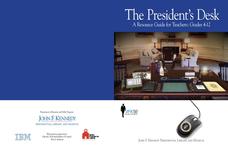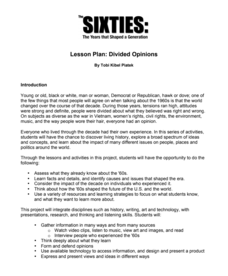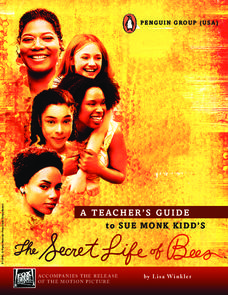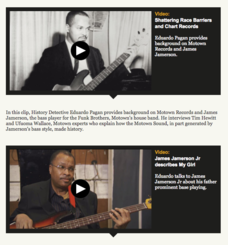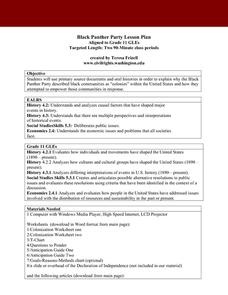Annenberg Foundation
Poetry of Liberation
How do writers use words to protest injustice, challenge the status quo, and shape their own identities? Individuals watch and discuss a video, read author biographies, write poetry and journals, develop a slideshow, and complete a...
Staples Foundation For Learning
The President’s Desk
What stories can a desk paperweight and picture frame possibly tell us about the president of the United States? Pupils are transported to the desk of President John F. Kennedy through an engaging interactive site. The guide offers...
Curated OER
Romantic and 20th Century Period Music
Upper graders explore the similarities, differences, and depth of pop music from the Romantic era and the 20th century. They listen to selections that exemplify the Baroque, Romantic, and 20th century periods, then create presentations...
American Institute of Physics
African American Physicists in the 1960s
Physicists Herman Branson and Tannie Stovall provide young scholars with two very different perceptions of the status of African American physicists in the 1960s. After reading and comparing the bios of these two men, class members read...
DocsTeach
Civil Rights or Freedom? When Vietnam and the Civil Rights Movement Clashed
When Martin Luther King Jr. took a stand against the Vietnam War, interests collided. With a letter from Jackie Robinson to Lyndon B. Johnson, the baseball legend urges the president to remain firm in his resolve for civil rights. Young...
National Woman's History Museum
Defying Expectations: Unsung Hero: Marsha P. Johnson and the Stonewall Riots
The 1960s were a turbulent time, but the charismatic figure of Marshal P. Johnson is often left out of the provocative stories of the era. With primary sources that talk about Johnson and her role in the Stonewall Riots, scholars unpack...
DocsTeach
To What Extent was Reconstruction a Revolution? (Part 2)
While Reconstruction laid the groundwork, many believe its revolutionary ideals weren't realized until the 1960s Civil Rights Movement. Using the 1965 Voting Rights Act, budding historians consider why it took more than 100 years to...
Stanford University
Civil Rights Act of 1964
Was JFK a fallen Civil Rights hero—or a fraud? Learners examine Kennedy's own words and those of his critics to decide for themselves. After examining Kennedy's actions before his assassination, they determine what sort of legacy he left...
New York State Education Department
US History and Government Examination: June 2014
The 1960s marked a pivotal point for social and foreign policy in the United States. Using documents, such as speeches from Martin Luther King Jr. and John F. Kennedy, and authentic test prompts, class members consider the impact of this...
National Endowment for the Humanities
Revolution '67, Lesson 2: What Happened in July 1967? How Do We Know?
Even in a world in which dozens of participants and curious onlookers record every controversial event, the basic facts of what happened are often in dispute. Revolution '67, Lesson 2 explores 1967 Newark, New Jersey using an examination...
National Endowment for the Humanities
Revolution '67, Lesson 1: Protest: Why and How
To some people, protesting is as American as apple pie, but the factors that lead to protests can be as confusing to veteran activists as to today's youth. Revolution '67 explores the riots in Newark, New Jersey as a case study. ...
PBS
Lesson Plan: Divided Opinions
To gain a more in-depth understanding of the tumultuous 1960s, young historians examine video clips, listen to music, examine images, and interview survivors. Once they have a foundation of information about the period, class members...
Annenberg Foundation
America's History in the Making: Classroom Applications Four
The final installment of a 22-part American history series examines the many faces that make up the country's story. From Henry Ford to Tulio Serrano, scholars use biographical evidence and Internet research to uncover the people behind...
Annenberg Foundation
Egalitarian America
What does a true American represent? Scholars investigate the equal rights era of the 1960s and 1970s in the 20th installment of a 22-part series on American history. Using photographic, magazine, written, and video evidence, groups...
Penguin Books
A Teacher's Guide to Sue Monk Kidd's: The Secret Life of Bees
A 12-page teacher's guide to Sue Monk Kidd's The Secret Life of Bees provides the discussion questions and activities that lead readers to understand not only Lily's fears, but her reasons behind them.
PBS
The Sixties: Hitsville USA
James Jamerson. You probably heard him but may not have heard of him. But fans of Motown Records will certainly recognize his contributions to the sound that desegregated popular music during the 1960s. Challenge young history...
PBS
The Sixties: Notes from the Ho Chi Minh Trail
Young historians research the rationales for fighting the Vietnam War, and the controversies surrounding it. They watch film clips, examine photographs, and read Lyndon B. Johnson's message to Congress to gather information for a...
Seattle Civil Rights and Labor History Project
Dr. Martin Luther King's Visit to Seattle
How was the work of Dr. Martin Luther King Jr. viewed by others during the 1960s? After watching an oral history video, your class members will learn more about Dr. King's ability to personally connect with others, as well as...
Curated OER
Black Panther Party Lesson Plan
Why did the Black Panther Party feel colonized, and what methods did they employ to achieve empowerment? Your class members will engage in an online PowerPoint presentation, analysis of several documents, and discussion in order to...
Curated OER
The Kennedy Administration
From his inaugural speech to the Bay of Pigs, major events concerning the Kennedy presidency are discussed. Slides provide an array of images and web links to highlight some of the bigger issues surrounding President Kennedy. The...
Curated OER
John Lennon
Here is a great example of the type of biographical presentation your class could create. They can view this informational biography of John Lennon to learn about a famous person or as inspiration for a research project. Each slide...
Curated OER
1960 America: Foreign Policy
The 1960's marked shifts in American culture, politics, and policy. Your class groups up to research a series of primary source documents resulting in a timeline and a 15 minute oral presentation. Active learning all the way.
Curated OER
Space Race Quiz
In need of a 14 question multiple choice quiz on the space race? This quiz will challenge your class to recall facts related to the moon landing, Neil Armstrong, Sputnik, and America's race to space with Russia.
Curated OER
The Beatles
All you need is love! Find out how The Beatles met, what they recorded, and when they broke up. This resource could be a good way to set the stage or build a context for society in the 1960's and 70's, or as part of a music history lesson.



